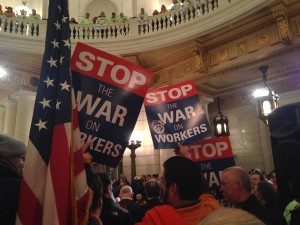Pensions, paycheck protection pit PA politicians against public-sector unions

By Eric Boehm | PA Independent
The pitched battles between fiscally prudent Republicans and the powerful public-sector unions that have taken place in several Midwestern states during the past few years might finally be making their way east to Pennsylvania.
It’s early in the legislative session, but Republican lawmakers have their eyes on two major changes in public policy that likely would set off waves of protests at the state Capitol.
STRONG WORDS: Union workers showed up in force Tuesday to protest paycheck protection legislation at the state Capitol. Expect more of this in the coming months as lawmakers tackle issues very dear to the unions.
First, there’s the ongoing public-pension crisis in the state. Taxpayers will be on the hook for more than $2 billion in payments to the state’s two pension funds this year, with higher payments coming in subsequent years.
Those payments to retired public-sector workers seriously threaten to crowd out some other parts of the state budget, and that might be enough to get lawmakers to address the situation.
“The largest cost and growth in next year’s budget will be pension costs,” said state Senate President Joe Scarnati, R-Jefferson, earlier this month. “To pay the bill will mean that we are forced to flat-fund or reduce-fund many areas of the budget that have already been cut close to the bone.”
There’s no real consensus on how to fix the pension mess — perhaps Gov. Tom Corbett will provide the General Assembly with some guidance in next week’s budget address, but that hardly means they would heed it — aside from a growing sense that something must be done.
But the only way to make a significant hole in the state’s $47-billion pension debt is to reduce benefits for existing and future employees. Retirees’ benefits are sacrosanct.
Unions would not support any cuts to existing employees benefits, and that’s putting it lightly.
The second issue is less well-known to the public, but is equally important to the public sector unions.
SCARNATI: The top Republican in the Pennsylvania state Senate says 2014 is the year the state must attack the pension crisis, or face flat-funding for some programs and cuts for others in the state budget.
Under state law, members of those public-sector unions, which includes everyone from local public school teachers to the bureaucrats at the DMV, and everyone from the lowest-paid janitor at the state Capitol to the union bosses who earn more than six figures, have to pay dues to support the union.
Those dues are deducted automatically from workers’ paychecks by the state and deposited in the unions’ bank accounts where they fund activities like lobbying.
Some Republicans are pushing for so-called “paycheck protection” that would prevent the state from collecting those deductions on behalf of the unions. If passed, the unions’ members would have to voluntarily pay their dues.
It’s not hard to see why this is appealing to Republicans. They assume that scores of union members either will forget to send in their dues or will decide that they’d rather have that extra cash in their own pocket.
Either way, a major revenue stream for the unions’ political muscle would dry up.
And even thought the union dues can’t be used for political activities like campaigning for specific candidates, they can be used for things like sending mailers and lobbying legislators on certain issues.
That’s why more than 1,000 union members stormed the state Capitol on Tuesday in a dramatic show of political theater, demanding that lawmakers oppose the changes.
Oh, union dues can be used for rallies and protests too, by the way.
Paycheck protection was part of the vast array of reforms passed in Wisconsin under Gov. Scott Walker, and the evidence from the Badger State indicates how effective it can be. One prominent public sector union lost 88 percent of its dues-paying members in two years after the Act 10 reforms became law.
Two major labor unions already have issued warnings to their members about the potential consequences of paycheck protection, even though the bill hasn’t even received a committee vote.
After watching the fights in Madison, Wis., Lansing, Mich., and Columbus, Ohio, labor unions in Pennsylvania might be getting ready for a showdown of their own.
This column originally appeared in Region’s Business Magazine on Jan. 17, 2014 and has been edited from its original form.
Boehm can be reached at Eric@PAIndependent.com or EBoehm@Watchdog.org. Follow him on Twitter at @EricBoehm87.
The post Pensions, paycheck protection pit PA politicians against public-sector unions appeared first on Watchdog.org.







